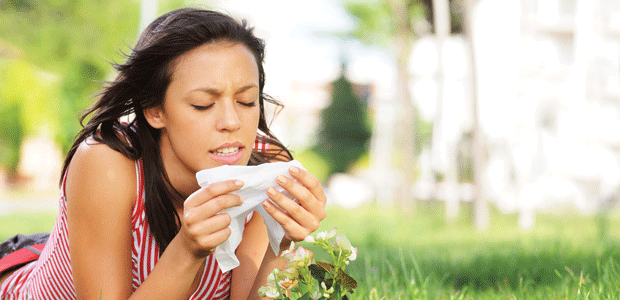Advertisement
Springtime Allergies
Hope for itchy eyes & noses

It’s that time of year, when the world blooms into springtime splendour. But many people are too busy dealing with sneezing attacks and itchy, watery eyes to appreciate the season. Children may grow out of allergies as they get older, but millions of people worldwide seem to grow into allergies as adults.
Although it’s not clear whether we can ever completely cure ourselves of an allergy once we’ve developed it, we can certainly take steps to significantly decrease the severity of our symptoms.
No hay and no fever
Despite the term hay fever, springtime allergies aren’t triggered by hay and don’t cause a fever—though we may feel like we’ve been hit by a vicious cold virus. Spring allergies are triggered by pollen from trees, which can begin spreading as early as January. Sadly, the worst culprits are the otherwise gorgeous oak, elm, willow, ash, poplar, sycamore, maple, and cypress trees.
The pollens from these trees end up in our eyes, nose, throat, and lungs. The immune system thinks that the “invading” pollen is harmful and launches an antibody reaction against it. This triggers histamine release, producing an allergic reaction.
The membranes lining the nose become irritated, causing itching, sneezing, and a runny nose with a clear watery discharge. Pollens that land in the eyes can make them red, itchy, watery, and swollen.
Some people also experience an itchy throat, coughing, or symptoms of asthma, such as wheezing and shortness of breath (if you experience either of the last two symptoms, you must see a doctor as soon as possible, as this can occasionally become life threatening). Once you attend to the emergency situation, you can consult your regular health care practitioner.
Get diagnosed
Mild seasonal symptoms are fairly easy for a health care practitioner to diagnose and treat. They may even include depression, appetite loss, or difficulty sleeping. If you’ve got more serious symptoms, or simply want to know what’s causing them, you can get tested for allergies by an allergy specialist.
An allergist will use skin testing (which places a small amount of each potentially allergy-causing substance under your skin) to determine what you’re allergic to. Ask an allergist to test not only for common pollens, but also to find out if you’re allergic to any foods.
Food allergies may be intimately linked to seasonal allergies. Eliminating problematic foods may decrease the load on your already overloaded immune system, potentially decreasing the severity of seasonal allergic reactions.
Natural treatments
If you’ve suffered with allergies for years, you’re probably already familiar with the traditional medical anti-allergy arsenal: prescription and nonprescription antihistamines, decongestants, anti-allergy eye drops, and corticosteroid nasal sprays.
Although the above can certainly relieve symptoms, there are also some natural remedies you may find helpful:
Keep the windows closed
Pollen counts are highest in the early morning, so keep your windows closed while sleeping and your car windows shut when driving. Rather than hanging sheets or laundry to dry in the sun where they can gather pollen particles, hang them indoors if possible.
Nasal flushing
There are various products available, usually based on a saltwater (saline) solution, that flush out the nose and sinuses, removing pollen particles and shrinking down inflamed nasal membranes. Never try to mix up your own solution at home; use a recommended product and follow directions closely.
Butterbur
A study published in the British Medical Journal found that an extract from butterbur, a plant native to Europe, Africa, and Asia, provided as much relief for allergy sufferers as a popular over-the-counter antihistamine after two weeks of use.
An advantage to the butterbur extract was that it relieved symptoms without triggering the drowsiness that often accompanies antihistamines.
Do not take butterbur if you suffer from any type of liver disease.
Quercetin
This flavonoid, found in red wine, grapefruit, onions, and apples, and available in supplement form, acts directly to inhibit histamine release.
Stinging nettle
A study in Phytotherapy Research showed that in a laboratory environment, stinging nettle extract inhibits some of the cellular events that result in seasonal allergy symptoms in our bodies. Talk to your health care practitioner if you take blood pressure medication, blood thinners, or water pills, or have diabetes.
Before using these or any other supplements, be sure to check with a qualified health care practitioner, particularly if you have any health concerns or are pregnant or breastfeeding. He or she can recommend an alternative way to relieve springtime allergies.
Types of allergies
Seasonal allergic rhinitis
- an allergic reaction also known as hay fever
- caused by outdoor allergens such as tree pollen
Perennial allergic rhinitis
- an allergic reaction
- caused by indoor allergens such as pet dander, dust mites, and mold
Stick it to allergies
Recent studies suggest that acupuncture may be another alternative in the arsenal against seasonal and perennial allergies.
- A 2009 Chinese meta-analysis of 12 studies involving 1,076 allergic rhinitis (AR) patients concluded that acupuncture is “effective and safe” and may have advantages over routine medical treatment.
- A 2009 Korean review of seven high-quality acupuncture trials found results were mixed. For perennial AR, acupuncture proved to be effective; for seasonal AR, the results were unclear.
- A 2009 Russian study of 24 patients who were administered acupuncture for seasonal AR reported a 75 percent “marked improvement” in health conditions, including disappearance of clinical symptoms.
- A 2008 German randomized, controlled trial of 5,237 AR patients found that those who received acupuncture had improved quality of life compared to the control group, and these benefits were “relevant and persistent.”




